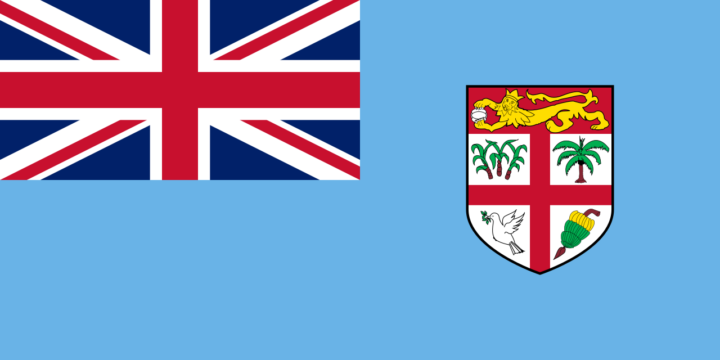The Pacific island state of Fiji has become the 39th nation to ratify the Treaty on the Prohibition of Nuclear Weapons. The Fijian ambassador to the United Nations, Satyendra Prasad, announced the ratification at an event on 7 July to mark the third anniversary of the adoption of the landmark agreement by a large majority of the world’s nations. He said the treaty has particular resonance in the Pacific as a region that has suffered from decades of nuclear testing by colonial powers.
Fiji played an active role in the negotiation of the nuclear weapon ban treaty in 2017, calling for “a commitment to provide assistance to victims [of the use and testing of nuclear weapons] and environmental redress for Pacific islanders who have lost much as a result of nuclear testing”. Frank Bainimarama, the Fijian prime minister, was among the first world leaders to sign the treaty when it opened for signature in New York on 20 September 2017.
Way to celebrate the 3rd anniversary of the #nuclearban treaty: Fiji has just become the 39th state to ratify the #nuclearban treaty! ?Congratulations @FijiMissionUN ? Fiji’s ratification is all the more important because of its experience of the impacts of nuclear testing. pic.twitter.com/tSPX3wjvYD
— ICAN (@nuclearban) July 7, 2020
In a unanimous vote, the parliament of Fiji approved ratification of the treaty on 28 May this year. Addressing their parliamentary colleagues ahead of the vote, the attorney-general and minister of defence noted Fijians’ first-hand experience of the long-term health impacts of nuclear weapons as a result of their involvement in the British nuclear testing programme at Malden and Kiritimati islands in the 1950s.
Fiji’s parliament just unanimously approved ratification of the UN Treaty on the Prohibition of Nuclear Weapons. Vinaka vakalevu! @fijiparliament #nuclearban pic.twitter.com/ELzx6X6chn
— Tim Wright (@TimMilesWright) May 28, 2020
Almost 300 Fijian soldiers participated in the tests, many of whom later developed cancers and other illnesses due to exposure to ionising radiation. The Fijian soldiers were often given more dangerous tasks than soldiers of other nationalities, including dumping radioactive waste – and seabirds that were killed or blinded by the tests – into the ocean.
Still to this day, the British government refuses to compensate the Fijian soldiers who participated in the nuclear test programme. “Too many men – our fellow Fijians – have gone to their graves without justice,” said Mr. Bainimarama in 2015 after announcing that his government would step in and offer a one-time payment to all remaining survivors, “closing an unfortunate chapter in our history”.
Fiji and other Pacific island states were instrumental in building international support for the negotiation of the nuclear weapon ban treaty. In a working paper submitted to the United Nations in 2016, Fiji, Nauru, Palau, Samoa, and Tuvalu commented that the lived experience of nuclear weapons in the Pacific, where more than 300 atomic and hydrogen bombs were tested over the course of half a century, had motivated them to work for a treaty-based ban.
Fiji is the seventh member of the Pacific Islands Forum to become a state party to the Treaty on the Prohibition of Nuclear Weapons, after Palau, New Zealand, the Cook Islands, Samoa, Vanuatu, and Kiribati. Nauru and Tuvalu have signed the treaty but not yet ratified it.
Honoured to deposit Fiji’s instrument of ratification for the Treaty on the Prohibition of Nuclear Weapons (TPNW) at UN on 3rd Anniversary of it’s adoption. Thank you #ICAN for hosting a commemorative event. Thank you to @fijiparliament, civil society for supporting this effort. pic.twitter.com/kAO4HGuQJI
— Satyendra Prasad (@sprasadfj) July 8, 2020
Fijian civil society organisations and churches have long campaigned against nuclear weapons and colonialism in the Pacific. In the past, many of the conferences of the Independent and Nuclear-Free Pacific Movement were held in Fiji’s capital, Suva. That activism continues today, as was seen when community leaders provided testimony to the parliament this year in support for Fiji’s ratification of the ban treaty.
Dr. Vanessa Griffen, a Fijian activist and ICAN campaigner, joined many other Fijians in celebrating the news today’s ratification: “For me, it is very special to have Fiji ratify, because apart from being a state in the Pacific island region which did suffer from many years of nuclear weapons testing, Fiji was a very important country for the start of our anti-nuclear movement.”
Fiji has been a crucible of the Pacific’s anti-nuclear and de-colonisation movements. Today, it ratified the UN treaty outlawing nuclear weapons. Another critical moment, writes Vanessa Griffen and Talei Luscia Mangioni @guardian @nuclearban https://t.co/yUsZBkx9dS
— Ben Doherty (@BenDohertyCorro) July 8, 2020
On the day that marks three years since the adoption of the Treaty on the Prohibition of Nuclear Weapons (#TPNW), #Fiji deposited its instrument of #ratification. See ? https://t.co/k1j4O49BL0.#TPNW #nuclearweapons pic.twitter.com/jkS0jUklpX
— ODA (@UN_Disarmament) July 7, 2020










